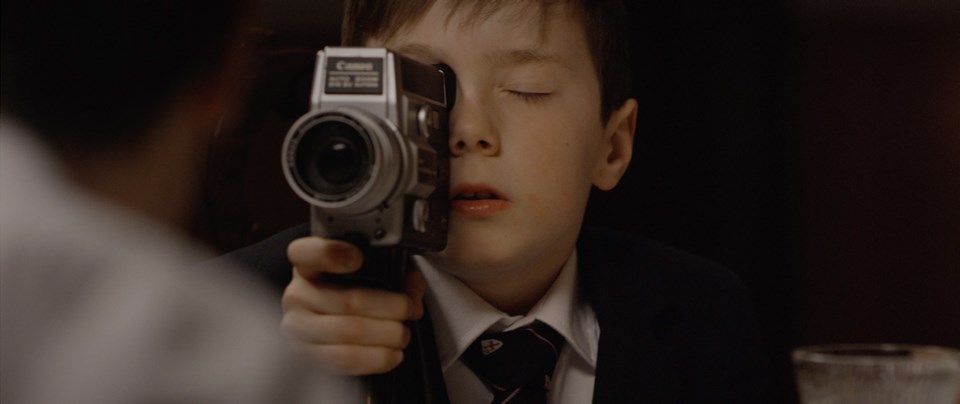Connor Gaston laughs as he recalls his be-careful-what-you-wish-for moment last fall when he realized he would have to start shooting the short version of a feature film he’s trying to get off the ground.
It came after he learned he would receive $32,000 to put toward producing his short The Cameraman from the Bell Media Harold Greenberg Fund’s Shorts-to-Features funding program.
“I remember thinking: ‘I’m not going to worry about production. I just want to get this grant,’ ” said Gaston, whose 16-minute film made its world première Thursday at the Busan International Film Festival in South Korea.
“Then I went: ‘Oh my God, I’ve got to make this now!’ I’ve got to work with dogs and kids and 16-millimetre film and the ’70s [when the film is set] — everything you want to stay away from.”
Gaston, whose feature debut The Devout recently swept B.C.’s Leo Awards, wrote and directed The Cameraman, which focuses on two brothers who react differently to their abusive father (Mur Meadows), who suffers from Huntington’s disease. While Francis (Octavian Kaul) stands up to his father, whose erratic behaviour is also taking a toll on their mother (Celine Stubel), his younger brother Ed (Nolan Hupp) records their dysfunctional existence with his Super 8 camera, capturing memories in sharp contrast to happier times.
The Cameraman, produced by Arnold Lim, reunited Gaston with some of his Devout collaborators, including director of photography Daniel Carruthers and visual-effects artists Denver Jackson and Chris Orchard.
The film, which also had its North American première Thursday at the Vancouver International Film Festival, is a lyrical, subtly nuanced and visually striking portrait of dysfunction through a childhood lens.
Gaston’s film was a family affair, and not just because The Cameraman was inspired by the 1994 novel written by his father Bill Gaston, the author and a professor in the University of Victoria’s writing department.
The story in his father’s book, which opens with the onscreen death of an actress by lethal injection, is told from the perspective of a cameraman who trains his lens on a manipulative director.
“Two years ago, I adapted the novel more or less verbatim, and it didn’t work as well,” the UVic fine arts graduate admits. “I kept adjusting it to the point there was almost no resemblance.”
After his father read his adaptation, they agreed The Cameraman, as originally envisioned, worked better as a novel, Connor Gaston said.
His father narrates the film as the grownup voice of Francis, and his mother, author Dede Crane, got on board as dog wrangler for pivotal scenes that featured the family’s rescue dog, Sally.
“Having my dad do the voiceover was really cool because I was inspired by his book and, in his book, his personality seeps into the characters,” Gaston said.
The Cameraman was filmed over two weekends in March, mostly at a dream location provided by Charles Isherwood, the film-loving Victoria realtor.
In response to a request on Facebook for a house “dressed for the 1970s,” Isherwood offered his family’s large, custom-built home near Sooke. With its imposing exterior white columns, a fireplace surround from the Lougheed family’s home in Alberta and pocket doors from a Francis Rattenbury mansion, the striking six-bedroom oceanview home across from Otter Point Park is a character in itself.
An important element, addressed in the novel, was Huntington’s disease, said Gaston, who extensively researched the genetic degenerative brain disorder to ensure it was authentically depicted.
He dedicated the film to Hedley Cullen, a middle-aged Victoria man with Huntington’s disease who acted as consultant. “The story to me was fictional in my head, and after I met Hedley it became incredibly real,” Gaston said. “He’s the nicest guy in the world.”
Meadows, who showed up at the audition in character as the irritable, physically deteriorating father “just blew us away,” Gaston said. Meadows was so convincing that production manager Darlene Tait suggested Gaston ask if he really had Huntington’s disease, Gaston recalled. The actor gleaned pointers from Cullen, such as the benefits of eating with a spoon rather than a fork, and lost weight for the role.
Gaston also felt lucky being able to cast The Cameraman, notable for its naturalism, from the local talent pool. He found newcomer Hupp in Nanoose Bay. “I didn’t have to work with him very much,” Gaston said. “You think he’s this little sociopathic maniac, but he ends up being the most emotionally complex and intelligent character.”
Vancouver-born Kaul, who plays young Hunter Zolomon in The Flash, had more experience, and rose to the different challenges of playing Francis. “It was a harder character to play in a way,” Gaston said. “It’s more nuanced, harder to pin down.”



